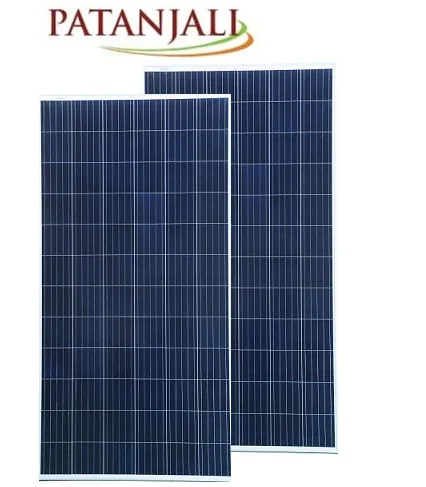Patanjali Solar Panel 1kW Sustainable & Affordable Price In India
Patanjali Solar Panels: Illuminating the Path to Sustainability
Solar panels are devices that convert sunlight into electricity, providing a reliable and eco-friendly alternative to traditional energy sources. Patanjali Solar Panels, backed by the brand's focus on quality and sustainability, offer efficient and durable solutions to harness solar energy and reduce carbon footprint.

Advantages of Patanjali Solar Panels
Patanjali Solar Panels offer numerous advantages, making them a preferred choice for those seeking renewable energy solutions:
-
High Efficiency: Patanjali Solar Panels are designed with advanced photovoltaic technology, ensuring optimal energy conversion efficiency and maximum power output.
-
Quality Assurance: Patanjali Solar Panels undergo stringent quality control measures to meet international standards, ensuring long-lasting performance and durability.
-
Sustainability Focus: As a brand known for promoting sustainable practices, Patanjali Solar Panels are manufactured with an emphasis on reducing environmental impact throughout the production process.
-
Energy Independence: By harnessing solar energy, users can reduce their dependence on traditional power sources, leading to significant cost savings and a reduced carbon footprint.
-
Versatility: Patanjali Solar Panels are available in various sizes and configurations, catering to different energy requirements and installation settings, from residential rooftops to large-scale commercial projects.
Patanjali Solar Panel Models
Patanjali offers a range of solar panel models, each designed to meet specific energy needs and installation requirements. Let's explore some of the notable models:
| Model Name | Features | Application |
|---|---|---|
| Patanjali Surya Shakti Panel | - Polycrystalline cells for efficient energy conversion | Residential and small-scale commercial installations |
| Patanjali Surya Shakti Plus | - Monocrystalline cells for enhanced performance and aesthetics | Residential and commercial installations |
| Patanjali Surya Prakash Panel | - Reliable performance and durability |
Large-scale commercial and industrial installations |
Installation of Patanjali Solar Panels: Lighting Up Your Environment
Installing Patanjali Solar Panels is a straightforward process that requires careful planning and adherence to industry best practices. Let's walk through the key steps involved:

Step 1: Site Assessment
Conduct a thorough site assessment to evaluate the suitability and efficiency of the solar panel system. Consider factors such as solar irradiation, shading, roof orientation, and available space to optimize energy generation.
Step 2: Design and Permitting
Engage a qualified solar installer to design the system layout and select the appropriate Patanjali Solar Panel model based on your energy requirements. Obtain any necessary permits and approvals from local authorities to ensure compliance with regulations.
Step 3: Procurement and Delivery
Procure the Patanjali Solar Panels and necessary equipment through authorized channels. Verify the product quality and ensure that all components are intact upon delivery.
Step 4: Installation and Mounting
With the assistance of a professional installer, proceed with the physical installation of the Patanjali Solar Panels. The panels are typically mounted on rooftops or ground-mounted using sturdy racks and brackets, ensuring proper alignment and secure fastening.
Step 5: Electrical Connections
After the panels are securely installed, the electrical connections are made. This involves wiring the panels to an inverter, which converts the DC power generated by the panels into usable AC power for your electrical appliances.
Step 6: Monitoring and Maintenance
Set up a monitoring system to track the performance of your Patanjali Solar Panel system. Regularly inspect the panels for debris or shading and clean them as needed to maintain optimal efficiency. Periodic professional maintenance is also recommended to ensure the longevity of the system.
